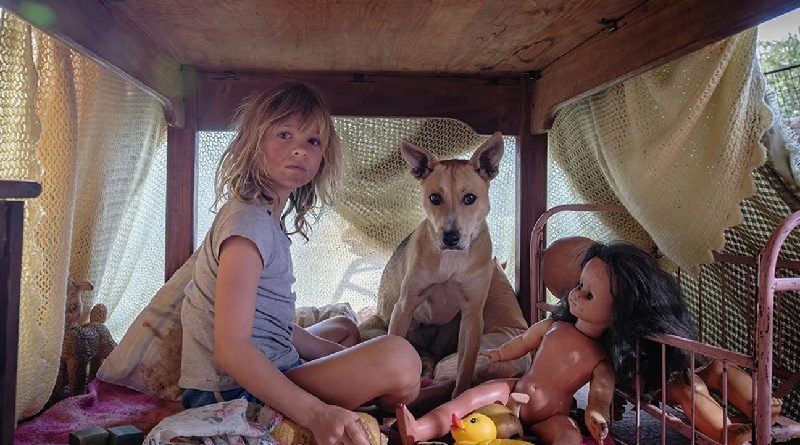Movie Review: Don’t Let’s Go to the Dogs Tonight
One-liner: This immersive and meandering coming-of-age portrait drama adaptation is artful, bold, haunting, timely and well-acted.
Based on the novel by Alexandra Fuller, Don’t Let’s Go to the Dogs Tonight is a film written, directed by and starring Embeth Davidtz. Set in Rhodesia during the elections, during the final stages of the Bush War when Robert Mugabe was voted in, the film immerses viewers in the life of a white family grappling with political change in their country. The story is told from the perspective of Bobo, an eight-year-old girl whose naïve view of the scenario offers a refreshing honesty to the situation, particularly as the white minority is confronted with harsh realities after colonial rule.
This slow descent into self-realization unfolds over the course of the film as happy-go-lucky farm girl, Bobo moves freely between her family and the staff, contrasting her family’s perspective with the plight of the people who serve them. The film is experiential, reflecting moments from that era in an artful and spontaneous fashion.
The cinematography by Willie Nel gives this textured coming-of-age political drama a poetic undertone, capturing each scene with a childlike wonder. The visuals are captivating, settling into each moment with a tactile and curious angle that underscores Bobo’s point of view. The film flows from one scene to the next, stitched together with reflective narration from its young lead.
A provocative and thought-provoking portrait of an African farm, the film serves as a snapshot of the time, brought to life with a sense of docudrama realism. Young Lexi Venter is a revelation as Bobo, bringing honesty and resilience to the plucky role and giving Don’t Lets Go to the Dogs Tonight a sense of continuity. The dependable cast also includes Embeth Davidtz, Zikhona Mbali, Rob van Vuuren and Albert Pretorius, who all deliver solid performances.
A sentimental feel runs through the film, as if it’s relaying memories, underscored by photographs shown in the closing credits. Touching on themes from racism and social upheaval to gender relations and class structures, the film unearths a country in deep crisis. It holds a mirror up to the dying embers of the colonialist regime, taking place at a crucial turning point for Zimbabwe as it moved from Rhodesia to its new name with the rise of Robert Mugabe.

“Maybe it is time we left the farm?”
Tension builds as a growing concern with “terrorists” threatens to upend life as the white population knew it. Struggling under the weight of such change, the family dynamics shift, particularly as the little girl’s mother, Nicola, comes to terms with the end of an era, having anchored her identity in her race, privilege, and family’s land.
Don’t Let’s Go to the Dogs Tonight has an honest, raw, and bold approach to its storytelling, amplified by the innocent perspective which gives it license to “let it all hang out.” A brave and immersive drama, it delivers many memorable moments, some that revel in joy and others that wallow in sorrow. Grappling with difficult and challenging subjects, it doesn’t shy away from heartache and turmoil, essentially stringing together a series of vignettes.
The film plays out like a stream of consciousness with young Lexi as our guide. The young actress masterfully strings everything together, utterly convincing in her performance and able to get to the heart of matters without inhibition. Echoing her performance is Embeth Davidtz, whose committed and brave turn shows a matriarch on a downward spiral as her world crumbles beneath her feet.
Capturing various haunting moments and immersing audiences in this authentic place and time, Don’t Let’s Go to the Dogs Tonight presents a beautifully textured and earnest drama with a poetic finesse. While the story elements keep the film on the front foot, there are a few lulls in pacing where a sharper narrative and driving force may have helped improve the rhythm.
As a soft focus portrait, the film can sometimes make it difficult to unearth its social commentary, as it seems more concerned with simply portraying the existential crisis of a white family in their last days on their farm. As it stands, it’s a beautiful and artfully constructed film that conveys a haunting and provocative retelling of this crucial turning point through a strong lead performance and many timely themes. Don’t Let’s Go to the Dogs Tonight remains relevant and captivating even if it gets a little lost along the way.
Haunting and thoughtful, Don’t Let’s Go to the Dogs Tonight is a solid adaptation brought to life by a passionate actor, writer, and director who’s deeply invested in the story. Davidtz delivers with a sense of passionate indignation, moving from documentary realism to flirt with magic realism by way of flashbacks and a playful innocence, operating with a sense of imagination, whimsy and urgency.
The bottom line: Poetic





